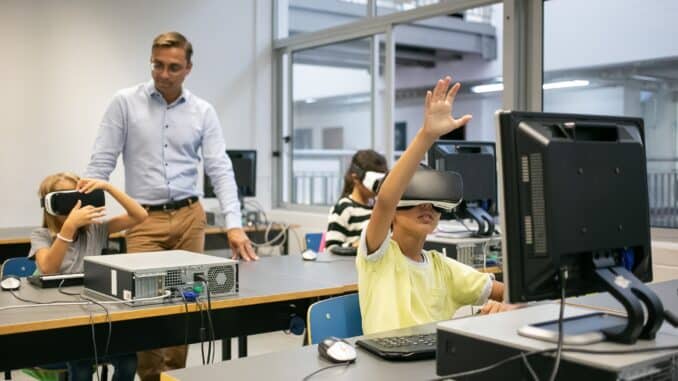
When you think of Artificial Intelligence (AI), you might picture robots taking over our jobs or futuristic technology that’s still years away. But the truth is, AI is already here and it’s changing the way we learn.
Gone are the days of boring lectures and static textbooks. Today’s classrooms are interactive, personalized, and powered by AI. From virtual reality field trips to adaptive learning software, the possibilities are endless. And the best part? It’s making education more accessible and effective than ever before.
One of the biggest ways AI is changing education is through personalized learning. With the help of algorithms and machine learning, AI can analyze a student’s strengths, weaknesses, and learning style, and tailor the curriculum to their specific needs. This means students can work at their own pace, focus on the areas they need to improve, and spend more time on the topics they’re passionate about.
Another way AI is changing education is through virtual reality (VR) and augmented reality (AR) technology.
Imagine being able to visit ancient Egypt or the Great Barrier Reef without ever leaving the classroom. With VR and AR, students can explore new places, learn about different cultures, and even take virtual lab experiments, all from the comfort of their own seats.
AI is also revolutionizing language learning, by creating virtual language tutors that can understand and respond to spoken language in real-time, which provides a more interactive and immersive experience for students.
But AI isn’t just changing the way students learn – it’s also changing the way teachers teach. AI-powered tools can help teachers grade assignments, provide feedback, and even identify students who are struggling. This frees up teachers’ time to focus on the human element of teaching, like building relationships with students and providing individualized support.
Of course, there are concerns about the use of AI in education. Some worry that it will replace human teachers, while others are concerned about privacy and the ethical implications of using AI to track and analyze student data. But the truth is, AI has the potential to enhance education in ways we never thought possible. And as long as we approach it with caution and transparency, it can be a powerful tool to improve the learning experience for students and teachers alike.
So, the next time you’re in a classroom, take a look around. Chances are, you’ll see some form of AI being used. From personalized learning to virtual reality field trips, it’s clear that AI is changing the face of education. And the best part is, it’s just the beginning. The future of education is exciting and we can’t wait to see what comes next!

Be the first to comment